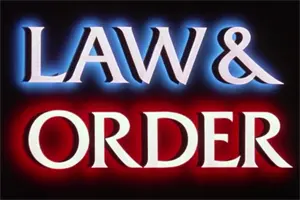Why can't TV try to envision an alternative to police?
-

In January, Dick Wolf told critics his many shows devoted to law enforcement -- from Law & Order: SVU to FBI to Chicago P.D. -- "are not making political statements in any way, shape, or form." But as the Chicago Tribune's Nina Metz points out, the George Floyd protests "prove otherwise — that valorizing fictional police is an inherently political stance when the experiences of people in the real world contradict those portrayals with an alarming frequency. What the protests of the last few days have made clear is that they are about more than police killing unarmed black people, including George Floyd and Breonna Taylor. People are protesting policing as an irreparably broken institution, where racism thrives, power is abused and the protection of property is valued over human lives. Many activists are no longer backing reforms but proposing an entire rethinking of policing altogether: Abolishing it and replacing it with other systems." Metz also points out: "TV can be such a powerful medium when it comes to shaping how we think about the world around us. Wolf is a brand-name producer who heads up a TV empire of shows that consistently puts law enforcement on a pedestal. Wolf and his colleagues, both in front of and behind the camera, have accumulated considerable personal wealth thanks to these hero portrayals." Wolf, however, has declined to talk to the Chicago Tribune on the philosophy on shows like Chicago P.D. The deluge of TV shows prioritizing the law enforcement point of view has exhausted the cop show genre, says Metz. "If cop shows are stuck in a cycle of reinforcing the status quo, what if networks and streaming services thought bigger?" she asks. "What if they greenlit fictional shows set in a world imagined by activists, where policing was abolished and other systems were put in place?" Metz adds: "In order for policing alternatives to gain wider understanding and support, people have to be able to envision how that would even work and this is the great power of TV (and film): To imagine the things that we can’t yet imagine for ourselves." Color of Change president Rashad Robinson, whose 152-page study earlier this year found that TV essentially functions as pro-police propaganda, thinks a police alternative could be a positive step for TV networks. “I love the idea that Hollywood could dream of a world where we thought about safety and justice in very different ways,” Robinson said. “How do we keep communities safe but also how do we have a new form of justice that isn’t just about punishment but includes consequences? Because there would still have to be ways for people to deal with folks they didn’t like, or folks who cause harm. We have to still have a conversation about what to do when people are violent and a system where there are consequences.”
ALSO:
- TV's cop shows are undergoing reckoning -- except for at cop show-packed CBS: "What we appear to be seeing is a moment of accountability for the people who’ve created and starred in the widespread depictions of American policing on television, in which the cops are almost always the good guys, even if some are more complex than others," says Sam Adams. "And even when they’re not wholly good, they’re still the ones whose perspectives we see and whose feelings viewers are trained to empathize with." He adds: "But it’s also worth noting whom we haven’t heard from—namely most of the individuals associated with CBS, which has built its brand over the past 20 years on police procedurals like CSI, NCIS, Criminal Minds, Hawaii Five-O, and Blue Bloods, to name only a few, shows that generally portray police officers as not only noble and heroic but at times close to superhuman.
- Brooklyn Nine-Nine is among cop shows that have come under fire for pro-cop propaganda amid George Floyd protests
TOPICS: Dick Wolf, CBS, Brooklyn Nine-Nine, Chicago P.D., FBI, Law & Order, Law & Order: Special Victims Unit, George Floyd, Black Lives Matter
More Dick Wolf on Primetimer:
